Coca-Cola
U.K. Report Slams Coke’s “No Added Sugar” Claim On Lemon-Lime Juicy Water
 Coca-Cola, which bought the Innocent line of fruit-flavored juices in 2013, stands by its “no added sugar” claim, noting that the only sugar in the drinks comes from the fruits with which they are made. The report, however, says that argument amounts to "false virtue." While the packaging correctly claims the drink has no added sugar, the drink does contain eight teaspoons of natural sugars from grapes and pears. The National Food Strategy report, which examines the U.K. food system and targets food poverty in the country, was published in the same week as a U.K. Government anti-obesity initiative.[Image Credit: © The Coca-Cola Company]
Coca-Cola, which bought the Innocent line of fruit-flavored juices in 2013, stands by its “no added sugar” claim, noting that the only sugar in the drinks comes from the fruits with which they are made. The report, however, says that argument amounts to "false virtue." While the packaging correctly claims the drink has no added sugar, the drink does contain eight teaspoons of natural sugars from grapes and pears. The National Food Strategy report, which examines the U.K. food system and targets food poverty in the country, was published in the same week as a U.K. Government anti-obesity initiative.[Image Credit: © The Coca-Cola Company]
Aluminum Can Shortage Aggravates Coke Brands Scarcity
 Some brands of Coca-Cola have become scarce during the pandemic, and customers aren’t happy about it. According to a Business Insider report, “Twitter is filled with complaints from people who can't find their favorite Coke product.” Among hard-to-find brands on some store shelves are Caffeine-Free Coke, Cherry Coke, Coke Zero, Fresca, and Tab Cola. One explanation could be the current company policy of focusing on key brands, like Coke and Diet Coke, to keep store shelves stocked. Meanwhile, another problem has surfaced: a worsening aluminum can shortage is starting to affect all soft drink companies, and especially craft breweries that don't have bottles to fall back on. CNN has said the shortage may be due to soaring demand for canned beverages among homebound consumers.[Image Credit: © Coca-Cola]
Some brands of Coca-Cola have become scarce during the pandemic, and customers aren’t happy about it. According to a Business Insider report, “Twitter is filled with complaints from people who can't find their favorite Coke product.” Among hard-to-find brands on some store shelves are Caffeine-Free Coke, Cherry Coke, Coke Zero, Fresca, and Tab Cola. One explanation could be the current company policy of focusing on key brands, like Coke and Diet Coke, to keep store shelves stocked. Meanwhile, another problem has surfaced: a worsening aluminum can shortage is starting to affect all soft drink companies, and especially craft breweries that don't have bottles to fall back on. CNN has said the shortage may be due to soaring demand for canned beverages among homebound consumers.[Image Credit: © Coca-Cola]
Coca-Cola Seeks To Burnish Brand Presence Online
 The company is determined to take advantage of the tidal wave of online shopping during the pandemic crisis by spending big on top-quality content (i.e., photos, videos, product descriptions); prioritizing package options appropriate for online buying; boosting investment in eye-catching digital imagery; partnering with e-grocers and retailers to heighten in-app visibility; optimizing content for search engines; and testing new digitally-enabled fulfillment models. In the food service arena, the company is working with restaurants and third-party aggregators to ensure its beverages are prominently displayed on digital menus and in combos for mobile delivery of groceries and prepared meals. “Last but not least, the Coca-Cola Company is looking to trigger impulse purchases on digital path to purchase.”[Image Credit: © The Coca-Cola Company]
The company is determined to take advantage of the tidal wave of online shopping during the pandemic crisis by spending big on top-quality content (i.e., photos, videos, product descriptions); prioritizing package options appropriate for online buying; boosting investment in eye-catching digital imagery; partnering with e-grocers and retailers to heighten in-app visibility; optimizing content for search engines; and testing new digitally-enabled fulfillment models. In the food service arena, the company is working with restaurants and third-party aggregators to ensure its beverages are prominently displayed on digital menus and in combos for mobile delivery of groceries and prepared meals. “Last but not least, the Coca-Cola Company is looking to trigger impulse purchases on digital path to purchase.”[Image Credit: © The Coca-Cola Company]
Nestle
New Carnation Condensed Milk Targets The Vegan Market
 Made from a blend of oat and rice flour, the new variant from the iconic Nestlé brand is certified by the U.K.-based Vegan Society as suitable for bakers following a vegan diet. Carnation Vegan will launch on the British online marketplace Ocado in September, and at retailers Morrisons and Tesco in the U.K., and in Ireland, in October. According to the company, the vegan version “has a very simple taste with a hint of lightly toasted oats, which makes it very versatile for a wide variety of baking and sweet treats."[Image Credit: © Nestlé]
Made from a blend of oat and rice flour, the new variant from the iconic Nestlé brand is certified by the U.K.-based Vegan Society as suitable for bakers following a vegan diet. Carnation Vegan will launch on the British online marketplace Ocado in September, and at retailers Morrisons and Tesco in the U.K., and in Ireland, in October. According to the company, the vegan version “has a very simple taste with a hint of lightly toasted oats, which makes it very versatile for a wide variety of baking and sweet treats."[Image Credit: © Nestlé]
Nestlé Pure Life Debuts Flavored Water Lineup For Kids
 The Stamford, Conn.-based maker of purified water is introducing Fruity Water, a 100 percent pure water with a touch of natural fruit flavors and electrolytes for taste, but no sugar, sweeteners, preservatives, or artificial colors. The packaging – Tetra Pak cartons with paper straws (in the U.S.) and in packs of eight, twenty-four, and thirty-two – targets kids with “vibrantly colored” designs and ”sassy fruit characters.” Available in apple, watermelon, and tropical twist flavors, Fruity Water is being promoted through a digital and social media campaign launching this month. It will be sold through e-commerce sites such as Amazon.com and Walmart.com, as well as in retail stores, at a suggested retail price of $3.99 for an eight-pack, and $14.99 for a twenty-four-pack. [Image Credit: © Nestlé]
The Stamford, Conn.-based maker of purified water is introducing Fruity Water, a 100 percent pure water with a touch of natural fruit flavors and electrolytes for taste, but no sugar, sweeteners, preservatives, or artificial colors. The packaging – Tetra Pak cartons with paper straws (in the U.S.) and in packs of eight, twenty-four, and thirty-two – targets kids with “vibrantly colored” designs and ”sassy fruit characters.” Available in apple, watermelon, and tropical twist flavors, Fruity Water is being promoted through a digital and social media campaign launching this month. It will be sold through e-commerce sites such as Amazon.com and Walmart.com, as well as in retail stores, at a suggested retail price of $3.99 for an eight-pack, and $14.99 for a twenty-four-pack. [Image Credit: © Nestlé]
U.K. Mineral Water Brand Buxton Unveils Plant-Infused Flavored Water
 The Nestlé Waters’ brand has launched a flavored water that blends spring water, plant polyphenols extracted from raw green coffee beans, and magnesium. Fruit and herb flavors include lemon, lime & sage, pomegranate & basil, and blood orange & rosemary. The company says the beverages are packaging bottles that are fully recyclable and, like the whole Buxton range, and will be made from 100 percent recycled plastic by 2021. The waters are available from selected Boots stores in the U.K. for £1.79 ($2.31) per 500 ml bottle.[Image Credit: © Nestlé]
The Nestlé Waters’ brand has launched a flavored water that blends spring water, plant polyphenols extracted from raw green coffee beans, and magnesium. Fruit and herb flavors include lemon, lime & sage, pomegranate & basil, and blood orange & rosemary. The company says the beverages are packaging bottles that are fully recyclable and, like the whole Buxton range, and will be made from 100 percent recycled plastic by 2021. The waters are available from selected Boots stores in the U.K. for £1.79 ($2.31) per 500 ml bottle.[Image Credit: © Nestlé]
Other Companies
Marquis Revamps Brand Messaging And Packaging For Plant-Based Caffeine Drinks
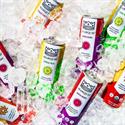 The Los Angeles-based healthy lifestyle company is showcasing a new growth strategy that touts its organic plant-based caffeine sources on its redesigned beverage cans. Marquis believes the messaging and packaging changes will drive expansion across its distribution network, create more retail opportunities, and grow the customer consumer base nationwide. The company removed the descriptor “organic energy” to refocus the message on the brand’s yerba mate-, green coffee-, and green tea-derived caffeine. The company’s mission is to move beyond energy beverages to the “fast-growing” functional drinks category. Marquis’s products, available in major retail chains nationwide, are USDA organic, and contain zero sugar and zero calories. The organic caffeine is certified Non-GMO, gluten-free, and vegan.[Image Credit: © Marquis]
The Los Angeles-based healthy lifestyle company is showcasing a new growth strategy that touts its organic plant-based caffeine sources on its redesigned beverage cans. Marquis believes the messaging and packaging changes will drive expansion across its distribution network, create more retail opportunities, and grow the customer consumer base nationwide. The company removed the descriptor “organic energy” to refocus the message on the brand’s yerba mate-, green coffee-, and green tea-derived caffeine. The company’s mission is to move beyond energy beverages to the “fast-growing” functional drinks category. Marquis’s products, available in major retail chains nationwide, are USDA organic, and contain zero sugar and zero calories. The organic caffeine is certified Non-GMO, gluten-free, and vegan.[Image Credit: © Marquis]
Tazo Tea Announces New Mixology Blends
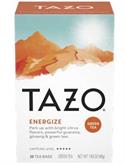
The Unilever-owned tea brand’s new blends include alcohol-free tea concentrates and “energy management” tea bags. The mixology concentrates come in Berry Hibiscus Margarita flavor (strawberry, hibiscus, and lime), and Ginger Lime Moscow Mule flavor (green tea, lime juice, and ginger). They can be mixed with water or seltzer to make a “flavorful” tea-based mocktail or cocktail. The brand also released two tea blends it says help in managing energy levels: Energize contains citrus, guarana, ginseng, and green tea; and Dream blends valerian root, lavender, passionflower and almond. Both of Tazo’s latest lines will be available in the U.S. in August for an RRP of $3.99. Unilever acquired Tazo from Starbucks in a $384 million deal in 2017.[Image Credit: © Unilever]
After Unilever’s 7-Month Review Of Tea Business, Fate Of Lipton Tea Still Unknown
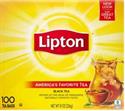 Analysts – and Unilever execs – are still scratching their heads about what to do with the Lipton tea brand, after the consumer goods giant decided to keep its Indian and Indonesian units, as well as its joint venture with PepsiCo, but spin off the rest into a separate entity that will include PG Tips and Pukka Herbs teas. CFO Graeme Pitkethly said the company had yet to come to a decision about what to do with Lipton. Analysts think Unilever will eventually try to sell the business or bring in a minority investor. Unilever launched the seven-month tea review after a consumer shift to herbal tea led to a slowdown in black tea sales in the U.S. and Europe. Lipton tea, which is important to Unilever’s black tea business, is also an integral part of the joint venture with PepsiCo.[Image Credit: © Unilever]
Analysts – and Unilever execs – are still scratching their heads about what to do with the Lipton tea brand, after the consumer goods giant decided to keep its Indian and Indonesian units, as well as its joint venture with PepsiCo, but spin off the rest into a separate entity that will include PG Tips and Pukka Herbs teas. CFO Graeme Pitkethly said the company had yet to come to a decision about what to do with Lipton. Analysts think Unilever will eventually try to sell the business or bring in a minority investor. Unilever launched the seven-month tea review after a consumer shift to herbal tea led to a slowdown in black tea sales in the U.S. and Europe. Lipton tea, which is important to Unilever’s black tea business, is also an integral part of the joint venture with PepsiCo.[Image Credit: © Unilever]
Energy Drink Sales Remain Healthy, But Mostly Among Stalwart Fans
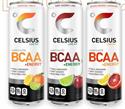 Despite a pandemic-induced sales slide, energy drinks remain a stronger performer in the nonalcoholic beverage category, thanks in part to the market perception that they deliver the functional quality of “vitality” to consumers. According to Mintel data, combined energy drink and energy shot sales now surpass $14 billion, with sales expected to hit $20 billion by 2024, especially after the coronavirus crisis eases. Another key to the success of the category is the fact that energy drinks companies continue to launch new products and expand use occasions through innovation. A loyal fan base has also tended to insulate the category from concerns over sugar content and artificial ingredients. The downside has been a lack of consumer reach: non-users see energy drinks as too sugary, too artificial, too caffeinated, or simply bad tasting. That, says Mintel, “presents a formidable barrier to trial.” Likely avenues of expansion will include fitness enthusiasts and digital gamers (esports), [Image Credit: © Celsius]
Despite a pandemic-induced sales slide, energy drinks remain a stronger performer in the nonalcoholic beverage category, thanks in part to the market perception that they deliver the functional quality of “vitality” to consumers. According to Mintel data, combined energy drink and energy shot sales now surpass $14 billion, with sales expected to hit $20 billion by 2024, especially after the coronavirus crisis eases. Another key to the success of the category is the fact that energy drinks companies continue to launch new products and expand use occasions through innovation. A loyal fan base has also tended to insulate the category from concerns over sugar content and artificial ingredients. The downside has been a lack of consumer reach: non-users see energy drinks as too sugary, too artificial, too caffeinated, or simply bad tasting. That, says Mintel, “presents a formidable barrier to trial.” Likely avenues of expansion will include fitness enthusiasts and digital gamers (esports), [Image Credit: © Celsius]
SodaStream Says It Takes The Time And Trouble Out Of Making Kombucha At Home
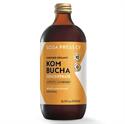 The Israeli home carbonation machine company has added an organic, shelf-stable Kombucha Concentrate to its lineup of at-home beverage products. According to the company, consumers can quickly make their own kombucha – difficult to make at home because of the long prep time – by carbonating water using a SodaStream machine and adding one of two new kombucha concentrates: original (apple and peach), and passionfruit & mandarin, the company says. Each concentrate is slow-brewed for 45 days. With more than one billion live probiotics in each serving, less sugar, and just 0-5 calories in each serving, the cost is 66-75 percent less per serving than leading kombucha brands. The concentrates retail for $9.99 each and are available on SodaStream’s website. [Image Credit: © SodaStream Inc.]
The Israeli home carbonation machine company has added an organic, shelf-stable Kombucha Concentrate to its lineup of at-home beverage products. According to the company, consumers can quickly make their own kombucha – difficult to make at home because of the long prep time – by carbonating water using a SodaStream machine and adding one of two new kombucha concentrates: original (apple and peach), and passionfruit & mandarin, the company says. Each concentrate is slow-brewed for 45 days. With more than one billion live probiotics in each serving, less sugar, and just 0-5 calories in each serving, the cost is 66-75 percent less per serving than leading kombucha brands. The concentrates retail for $9.99 each and are available on SodaStream’s website. [Image Credit: © SodaStream Inc.]
Copyright 2026 Business360, Inc.

